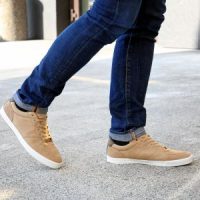In a Fall Case, Your Shoes Matter More Than You May Think

When you’re picking out your outfit for the day, you may have given a lot of thought to your shoes (although some of us consider shoes to be more important than others). But while you’re picking out your shoes for style, you may not realize that those shoes could play a very important role in a lawsuit should you end up being the victim of a fall.
Is it Your Fault?
In many cases, when someone falls on someone else’s property, the Defendant will try to blame the victim for the fall. They may say the victim wasn’t looking, that the victim was careless, or that the victim could have avoided the accident, but didn’t.
But they may say something else that could come as a surprise to you: they could say that you were wearing the wrong shoes.
There is no actual “shoe defense,” but rather, the argument over what shoes you were wearing, goes to comparative fault or comparative negligence.
What the Defendant is trying to do, is to show that you were wearing shoes that were wrong, poorly maintained, dangerous, or inappropriate for the situation. And if the jury believes this, they could apportion liability to you, so it’s important to be aware of the defense, and the arguments that could be made against you.
And it’s not completely far-fetched. Even the government, through the Centers for Disease Control, has issued reports about the correlation between footwear and the likelihood of falls.
What are Inappropriate Shoes?
Certainly some of us do wear shoes that are inappropriate. For example, if it is icy and rainy or snowy out, it may be dangerous to wear shoes that have no traction, or where the soles have been worn down.
Does this mean that you are being negligent unless you replace your shoes at the first sign that the soles are being worn down? Of course not.
Some shoes are just inherently dangerous such as high heels, which always carry a fall risk to some extent. Some may have soles that are made of a material that is just naturally slippery or which have low friction.
Destroying Evidence
Because many people are unaware of the importance of shoes in a typical fall case, many victims make the mistake of throwing out shoes that they wore during a fall. That can lead to a claim for spoliation by the other side—basically, a claim that you destroyed evidence that the other side needed, to properly prepare a defense in the case.
And even if the condition of your shoes isn’t an issue in the case, what’s on them could be—if you allege that you fell over or on a substance, that shoe that you just threw out may have had evidence of that exact substance on it. By throwing it out, you’ve just destroyed evidence in your case.
Were you injured in a slip and fall on someone else’s property? Call the Boston personal injury lawyers at The Law Office of Joseph Linnehan, Jr. today at 617-275-4200 for help and for a free consultation.
Sources:
blogs.cdc.gov/niosh-science-blog/2019/07/12/srf/
cdc.gov/niosh/topics/retail/slips.html
